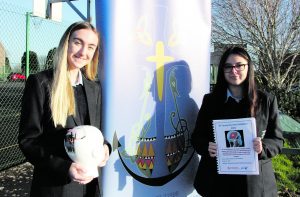
St Mary’s Mallow students Lydia Kelleher and Sophie Creedon’s project for the BT Young Scientist and Technology Exhibition is on the theme, ‘Sexist Subject Stereotypes Suppress the Development of STEM Skills’. Photo, S. Murphy.
Students from St. Mary’s Secondary School in Mallow has two projects in this week’s BT Young Scientist and Technology Exhibition, dealing with the subjects of sports-related brain injuries and the stereotyping of male and female roles and its impact on the development of STEM skills. The following is a look at the two projects which the students are presenting online this week, and we wish them every success when the winners of the competition are announced this Friday.
Sophie Creedon and Lydia Kelleher: An investigation into sports related cranial impacts and the design and development of wearable technology to better enable the measurement and recording of such head impacts.
The primary aim of our project is to develop a wearable device equipped with remote electronic pressure sensors that will measure the frequency and strength of head-ball impacts throughout a soccer training session and/or match. Simultan eously, we will develop a software application that will record (in real-time) the pressure data that will be measured by the wearable device.
We will also look at the feasibility of adapting our device for use in a variety of different training sessions personalised for each individual player type. Once we have developed our sensor technology, we plan to manipulate the parameters of the experiment to identify how variations in experimental conditions affect the severity and frequency of head impacts for different players.
We aim to investigate how variables directly related to an impact, such as force, angle of impact and nature of the impact (not investigated due to health and safety) and variables indirectly related such as gender and age might affect the strength of the impact.
Head-related traumas are some of the most common and dangerous injuries that occur among athletes. Head injury-induced dementia among former sports person alities has received a lot of attention in the media in the last few years. Therefore, identifying potential head traumas and cumulative head impacts is becoming more and more difficult and urgent for doctors, coaches, athletic trainers, and parents.
From our results, we hope to get a better understanding of the factors that might contribute to long-term head injury in soccer. Hopefully these results could be of use to medical personnel, trainers, coaches, etc to adapt training programs and procedures to each individual player.
Camille Ní Shúilleabháin and Clodagh Lehane: Sexist Subject Stereotypes Suppress the Development of STEM Skills.
Gender discrimination has lessened greatly over the last few decades, yet in schools there is still bias in terms of what subjects are typically offered. In all-girl schools, subjects like woodwork, metalwork and technical graphics are rarely offered, and, similarly, in all-boy schools subjects like home economics, craft and design and fashion are also rarely offered.For girls, there is also a much larger uptake of biology in senior cycle than physics or chemistry. The academic subject choices are a major factor in determining female engagement in STEM in third-level studies.
We saw in our research that, through gender stereotyping in play and through helping with DIY home tasks, boys are more likely to develop their practical and physical skills. This gender stereotyping continues into the subjects offered in secondary school. In our project we want to investigate whether doing a practical subject which involves working with physical objects develops STEM-related cognitive skills.
Previous studies of Irish secondary school students that we are aware of have focused on the difference between girls and boys Leaving Certificate results. In our study, we want to investigate whether there is a difference between girls’ and boys’ STEM-related cognitive abilities.
In our study we investigate if stereo typical subject choice offerings could be a factor in the underdevelopment of girls’ STEM skills and therefore a reason for their lack of confidence in pursuing STEM opportunities.